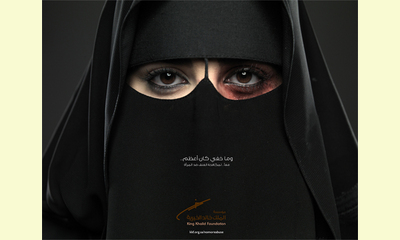|
|
Saudi Arabia passes historic domestic abuse legislation
un article par Lisa Anderson for Thomson Reuters Foundation
Saudi Arabia’s Cabinet has passed landmark
legislation recognising all forms of abuse,
including domestic violence, as offenses deserving
investigation, prosecution and punishment by law
enforcement agencies, according to local media
reports.

photo from adweek
click on photo to enlarge
Previously, the kingdom regarded domestic abuse
against women and children as private matters, but
under the new law all forms of abuse - including
physical, psychological and sexual - as well as the
threat of abuse, will be eligible for penal action.
According to the Saudi
Gazette, the Ministry of Social Affairs said
convicted abusers will receive a minimum jail term
of one month and a maximum of one year and/or
fines ranging from 5,000 to 50,000 Saudi riyals
($1,333 to $13,333). In the case of repeat
offenses, the punishment will be doubled.
In a statement to the Saudi Press Agency following
the Cabinet session, Minister of Culture and
Information Dr Abdulaziz Khoja said the new law
affords abuse victims provisions for shelter as well
as psychological, social and health care.
He noted there is also a specific provision in the
law to prevent workplace abuse. “All civilian or
military employees and all workers in the private
sector who learn of a case of abuse - by virtue of
their work - shall report the case to their
employers when they know,” the Cabinet said in a
statement.
Domestic violence, previously considered a private
family matter in the kingdom, is a relatively new
concept for public discussion. In April, the
kingdom published its first public
campaign ad against domestic violence,
featuring a close-up of a woman wearing a niqab
with only her eyes visible, one markedly
blackened. “Some things can’t be covered -
fighting women’s abuse together,” read the ad’s
text.
National Society for Human Rights member Suhaila
Zain Al Abideen Al Hammad told the Saudi Gazette
that she feared the new law was flawed because
women are still subject to male guardians who must
bring them to file abuse complaints, even though
they might well be the abusers.
Domestic abuse is still not openly discussed in
the kingdom, but a 2009 report cited by Arabian
Business found that of women seeking help at
primary health centres in Medina, 25.7 percent of
the 689 women surveyed had been victims of
physical domestic abuse, but only 36.7 percent of
them had notified their doctors.
[Note: Thank you to Janet Hudgins, the CPNN reporter
for this article.]
|








|
DISCUSSION
Question(s) liée(s) à cet article:
Protecting women and girls against violence, Is progress being made?
* * * * *
Commentaire le plus récent:
The 47 CPNN articles devoted to this theme suggest that indeed progress is being made.

|
|









